|
|
|
Sort Order |
|
|
|
Items / Page
|
|
|
|
|
|
|
| Srl | Item |
| 1 |
ID:
164649


|
|
|
|
|
| Publication |
Princeton, Princeton University Press, 2019.
|
| Description |
xv, 376p.hbk
|
| Series |
Princeton Studies in International History and Politics
|
| Standard Number |
9780691152134
|
|
|
|
|
|
|
|
|
|
|
|
Copies: C:1/I:0,R:0,Q:0
Circulation
| Accession# | Call# | Current Location | Status | Policy | Location |
| 059606 | 355.422/FRA 059606 | Main | On Shelf | General | |
|
|
|
|
| 2 |
ID:
142111
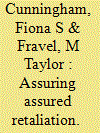

|
|
|
|
|
| Summary/Abstract |
Whether China will abandon its long-standing nuclear strategy of assured retaliation for a first-use posture will be a critical factor in future U.S.-China strategic stability. In the past decade, advances in U.S. strategic capabilities, especially missile defenses and enhanced long-range conventional strike capacity, could undermine China's nuclear retaliatory capability, which is based on a relatively small force and second-strike posture. An exhaustive review of Chinese writings on military affairs indicates, however, that China is unlikely to abandon its current nuclear strategy of assured retaliation. Instead, China will modestly expand its arsenal, increase the sophistication of its forces, and allow limited ambiguity regarding its pledge not to use nuclear weapons first. This limited ambiguity allows China to use the threat of nuclear retaliation to deter a conventional attack on its nuclear arsenal, without significantly increasing the size of its nuclear forces and triggering a costly arms race. Nevertheless, China's effort to maintain its strategy of assured retaliation while avoiding an arms race could backfire. Those efforts increase the risk that nuclear weapons could be used in a crisis between the United States and China, even though China views this possibility as much less likely than the United States does.
|
|
|
|
|
|
|
|
|
|
|
|
|
|
|
|
| 3 |
ID:
188210


|
|
|
|
|
| Summary/Abstract |
As global warming accelerates the melting of Arctic ice, opportunities for new transport routes open along with new strategic interests. This article examines how China pursues its interests in the Arctic and, specifically, the degree to which it seeks to work through the existing regime complex versus engaging in bilateral cooperation with Arctic states. China’s willingness to work through the regime complex or use bilateral cooperation depend on the specific issue. We find that China relies on global regimes regarding navigation issues, prefers bilateral cooperation for purposes of resource extraction, and prioritizes Arctic regimes to justify the pursuit of dual-use scientific research. We conclude that as a great power, China is well-positioned to use institutional complexity to its advantage. China uses existing regimes when it benefits Chinese interests, supplemented by bilateral initiatives as appropriate.
|
|
|
|
|
|
|
|
|
|
|
|
|
|
|
|
| 4 |
ID:
172087
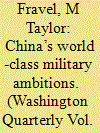

|
|
|
| 5 |
ID:
082177
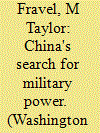

|
|
|
|
|
| Publication |
2008.
|
| Summary/Abstract |
How much military power does China ultimately desire? A close look at Chinese texts on military doctrine over the last decade reveals that Beijing's objectives for the use of military power are more certain than many policy analysts maintain
|
|
|
|
|
|
|
|
|
|
|
|
|
|
|
|
| 6 |
ID:
108559
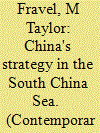

|
|
|
| 7 |
ID:
108050
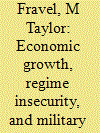

|
|
|
|
|
| Publication |
2011.
|
| Summary/Abstract |
Although China's armed forces have yet to complete its ambitious modernization program, its military strategy has begun to emphasize the ability to conduct noncombat operations such as disaster relief and peacekeeping in addition to traditional war fighting. This new component of China's military strategy is best explained by an unexpected relationship between economic growth and regime security. Although growth is key to the legitimacy of leaders in developing countries, it also creates new sources of domestic unrest and increases the vulnerability of the economy to external shocks, both of which, if unchecked, can harm future growth. As a result, developing countries such as China may use their armed forces to maintain political stability and provide services that the state lacks, such as emergency disaster relief. These conclusions are based on original data from China.
|
|
|
|
|
|
|
|
|
|
|
|
|
|
|
|
| 8 |
ID:
101625
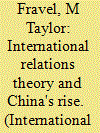

|
|
|
|
|
| Publication |
2010.
|
| Summary/Abstract |
Whether China's rise as a great power will be peaceful or violent is a question that animates scholars and policymakers alike. Power transition theory and offensive realism reach pessimistic conclusions about China's potential for armed conflict because of the benefits of aggression. Nevertheless, applications of these theories to China's rise fail to examine the size and scope of these benefits and to compare them systematically to the costs of conflict that other scholars have identified. To fill this gap, this article applies different international relations theories to identify potential benefits in one defined issue area, territorial conflict, and then weighs these benefits against the likely costs. The potential benefits of territorial expansion are limited, a finding that weakens confidence in the predictions of power transition theory and offensive realism but increases confidence in more optimistic arguments about China's rise based on economic interdependence.
|
|
|
|
|
|
|
|
|
|
|
|
|
|
|
|
| 9 |
ID:
080673
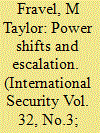

|
|
|
|
|
| Publication |
2008.
|
| Summary/Abstract |
Although China has been involved in twenty-three territorial disputes with its neighbors since 1949, it has used force in only six of them. The strength of a state's territorial claim, defined as its bargaining power in a dispute, offers one explanation for why and when states escalate territorial disputes to high levels of violence. This bargaining power depends on the amount of contested land that each side controls and on the military power that can be projected over the entire area under dispute. When a state's bargaining power declines relative to that of its adversary, its leaders become more pessimistic about achieving their territorial goals and face strong preventive motivations to seize disputed land or signal resolve through the use of force. Cross-sectional analysis and longitudinal case studies demonstrate that such negative shifts in bargaining power explain the majority of China's uses of force in its territorial disputes.
|
|
|
|
|
|
|
|
|
|
|
|
|
|
|
|
| 10 |
ID:
067208
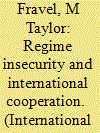

|
|
|
| 11 |
ID:
124938
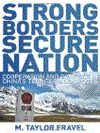

|
|
|
|
|
| Publication |
Princeton, Princeton University Press, 2008.
|
| Description |
xvi, 376p.Pbk
|
| Series |
Princeton Studies in International History and Poltics
|
| Standard Number |
9780691136097
|
|
|
|
|
|
|
|
|
|
|
|
Copies: C:1/I:0,R:0,Q:0
Circulation
| Accession# | Call# | Current Location | Status | Policy | Location |
| 057492 | 327.51/FRA 057492 | Main | On Shelf | General | |
|
|
|
|
|
|
|
|
|